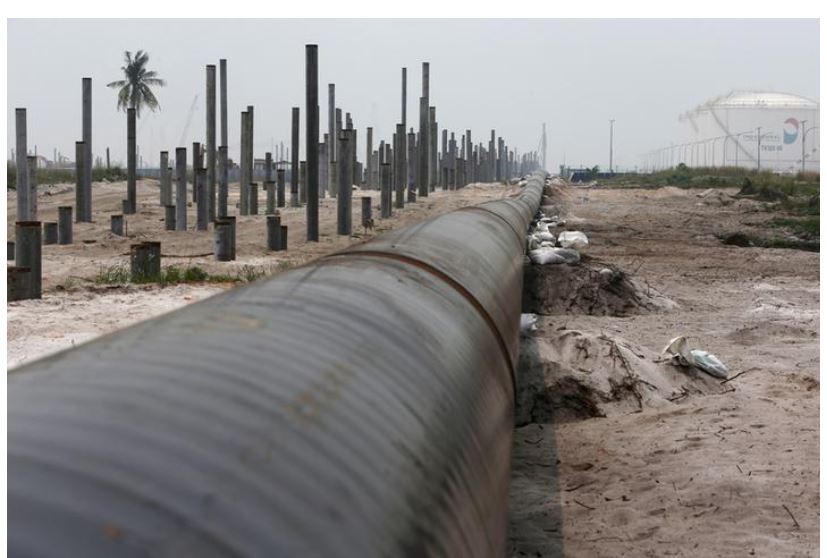Currently being constructed on a 2, 200 hectares at the Lekki Free Trade zone in Lagos, Dangote Refinery and Petrochemical is adjudged the single largest train petroleum refinery in the world and is being counted on by the federal government to nail the coffin on fuel scarcity in Nigeria.
With capacity to refine 650,000 barrels of crude per day, and a petrochemical plant of 750,000 metric tonnes of polypropylene per annum, it is 13 times bigger than the Indorama Eleme Petrochemicals Limited built by the federal government. Projected to be the biggest refinery in the world, it is also projected to have 1.5 times more capacity than the existing four oil refineries in the country, even if they are operating at 100 per cent.
With $14 billion loan from a consortium of local and international banks, Dangote refinery is expected to come on stream in the last quarter of next year.
According to the President of Dangote group, Aliko Dangote, the sum of $400 million was brought in for the construction of the refinery plant, out of which N16.3 billion had been paid for the acquisition of 2,200 hectares of land, with expectation of earning $5 billion annually from the export of surplus products.
All in all, projections about the plants are all optimistic at the moment.
“With the refinery, there will be no more importation of fuel,” an enthusiastic Dangote said, “Because 40% of our foreign exchange needs go into the importation of petroleum products. If we produce here and sell here, everything would be done in Naira and this creates jobs. We are stopping the exportation of jobs and the creation of poverty. We are doing this by extracting by-products from crude and some of these components are in high demand outside the country. It is the same thing with fertilizer,” he said
He estimates that the refinery can load 2,680 trucks per day, meaning about 10, 000 trucks in four days. Loading by sea and shipping to Calabar and other south-south states will also cut out the need for tank farms.
“A place like Apapa has tank farms in residential area which is dangerous for the residents,” Dangote said.
With on-going construction at the site, over 1,500 workers have been engaged directly by Dangote Refinery through various contractors handling the jobs and when operational about 1,200 will be engaged directly while ancillary jobs of about 150, 000 will be from an indirect and various allied contractors service providers.
The way the refinery is being packaged is as an antidote to Nigeria’s fuel crisis. Apart from FG’s faith in the project and Dangote’s utterances, Mr. Devakumar Edwin, Group Executive Director, Strategy, Portfolio Development and Capital Projects is also echoing the line.
“There will be no more queues at the filling stations due to fuel shortage, which cause traffic and waste innumerable man hours. And, last but not the least, the quality of our products will be high because we are coming out with Euro V grade. In Europe and in the United States, the refineries are now being converted to Euro V grade. In our own case, we are building a refinery which will produce Euro V grade from day one. Finally, huge amount of foreign exchange will be earned from the export of gasoline, diesel, aviation jet fuel and polypropylene,” he said.
Edwin said before the commencement of construction of the project a lot of risk analyses was conducted.
“The original thought was that we had everything we needed in Nigeria, i.e. the crude oil. When we started analysis, we realised that it was highly risky to place all our eggs in one basket, by relying only on Nigerian crude. So, we decided to expand the capability of the refinery to handle oil from different sources. Today, the Dangote Refinery can process a wide range of crudes, such as all the African crudes including that of Algeria, Libya, Angola, Gabon, Equatorial Guinea, etc., the U.S. crudes, Arab Light, etc. Since we are not dependent on Nigerian crude, we are not prone to the risk of the Niger Delta disturbance. We do not use pipelines; rather, we use ships. We use Single Point Mooring Buoys (SPMs) for offloading the crude and loading the products,” he said.
With this projections, Dangote Refinery is already going ahead to plan for a outlets for their products, long before the project is even completed.
The Head, Quality Assurance/Quality Compliance, Construction, Dangote Oil Refining Company, Mr. Rama Putta, said “In September 2018, we are going to commission our trading facilities, which consists gantries for filling the trucks, and 35 tanks for storing the fluids will be ready. Every day, 2,600 trucks are going to be filled with petrol, diesel, kerosene, and jet fuel.
“We will buy the products from other countries, because by that time our products will not be ready, and trade them for one year. This is to test our trading facilities. By September 2019, we will sell our own products.”


